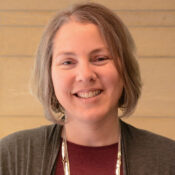
Speaker
Mari Magler
Director of the McBurney Disability Resource Center
Mari Magler, J.D., is the director of the McBurney Disability Resource Center at UW–Madison. She has worked in the disability field since 1994 and in higher education since 2005. She earned her Juris Doctor from Hamline University School of Law, and her bachelor’s in linguistics from Metropolitan State University. She co-authored “The Mentor’s Companion: A Practical Guide to Mentoring” and “A Plan for Mentorship of Educational Interpreters in Minnesota.”
Speaking in
A Disability Primer: Reclaiming, Imagining, Creating Change
When we reflect on our nation’s history and some of the more recent conversations around social justice, it is clear that society was not intended or designed for people with disabilities. Even 32 years after the passage of the Americans with Disabilities Act, disabled people are still fighting for equal access and inclusion.
In this session, we will review pieces of disability history in the United States and recall key moments in activism on disability justice. How we think about disability needs to be reframed to embrace access and inclusion as a shared societal norm. Collectively, engaging in conversations on disability and ableism is one way to affect change. We will highlight disabled activists, past and present, and honor their legacies in continuing these needed conversations. We will talk about ways to reframe disability through the social model of disability and steps to actively engage and interrupt ableism at the University.
Participants in this session will:
- Review some of the history of disability in the United States
- Learn about some of the key moments in activism centered on disability justice
- Understand the difference between the medical and social models of disability
- Gain an understanding of the underpinnings of ableism and how it presents today
- Strategize actionable steps to recognize and disrupt ableism